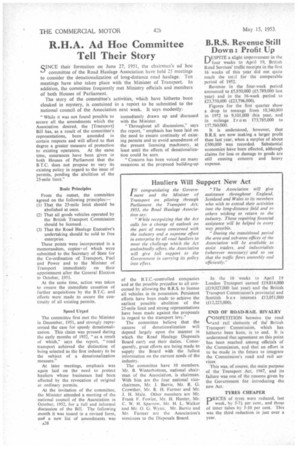R.H.A. Ad Hoe Committee Tell Their Story
Page 30

If you've noticed an error in this article please click here to report it so we can fix it.
SINCE their formation on June 27, 1951, the chairman's ad hoc committee of the Road Haulage Association have held 25 meetings to consider the denationalization of long-distance road haulage. Ten meetings have also taken place with the Minister of Transport. In addition, the committee frequently met Ministry officials and members of both Houses of Parliament.
The story of the committee's activities, which have hitherto been cloaked in mystery, is contained in a report to be submitted to the national council, of the Association next week. It says modestly:
"While it was not found possible to secure all the amendments which the Association desired, the [Transport] Bill has, as a result of the committee's representations, been amended io certain respects and will afford to that degree a greater measure of protection to existing operators. At the same time, assurances have been given in both Houses of Parliament that the B.T.C. does not propose to vary its existing policy in regard to the issue of permits, pending the abolition of the 25-mile limit."
Basic Principles From the outset, the committee agreed on the following principles:— (1) That the 25-mile limit should be abolished at once.
(2) That all goods vehicles operated by the British Transport Commission should be licensed.
(3) That the Road Haulage Executive's undertaking should be sold to free enterprise.
These points were incorporated in a memorandum, copies • of which were submitted to the Secretary of State for the Co-ordination of Transport, Fuel and Power and to the Minister of Transport immediately on their appointment after the General Election in October, 1951.
At the same time, action was taken to ensure the immediate cessation of further acquisitions by the B.T.C. and efforts were made to secure the continuity of all existing permits.
Speed Urged The committee first met the Minister in December, 1951, and strongly represeined the case for speedy denationalization. This claim was pressed during the early months of 1952, " as a result of which," says the report, "road transport achieved the distinction of being selected as the first industry to be the subject of a denationalization measure."
At later meetings, emphasis was again laid on the need to protect hauliers whose businesses had been affected by the revocation of original or ordinary permits.
At the invitation of the committee, the Minister attended a meeting of the national council of the Association in October, 1952, for a full and informal discussion of the Bill. The following month it was issued in a revised form, and a new list of amendments was A28
immediately drawn up and discussed with the Minister.
"Throughout all discussions," says the report. "emphasis has been laid on the need to ensure continuity of existing permits and to avoid amendment of the present licensing machinery, at least until the effects of denationalization could be seen.
"Concern has been voiced on many occasions at the proposed building-up of the B.T.C.-controlled companies and at the possible prejudice to all concerned by allowing the B.R.S. to license all vehicles in its possession. Persistent efforts have been made to achieve the earliest possible abolition of the 25-mile limit and strong representations have been made against the proposals in regard to the transport levy."
The committee believe that the success of denationalization will depend largely upon the manner in which the Road Haulage Disposals Board carry out their duties. Consequently, great efforts are being made to supply the Board with the fullest information on the current needs of the industry.
The committee have 10 members. Mr. B. Winterbottom, national chairman of the Association, is chairman. With him are the four national vicechairmen, Mr. J. Barrie, Mr. R. G. Crowther, Mr. R. H. Farmer and Mr. J. H. Male. Other members are Mr. Frank F. Fowler, Mr. H. Hunter, Mr. C. W. H. Sparrow. Mr. H. L. Walker and Mr. 0. G. Wynn. Mr. Barrie and Mr. Farmer are the Association's nominees to the Disposals Board.




























































































